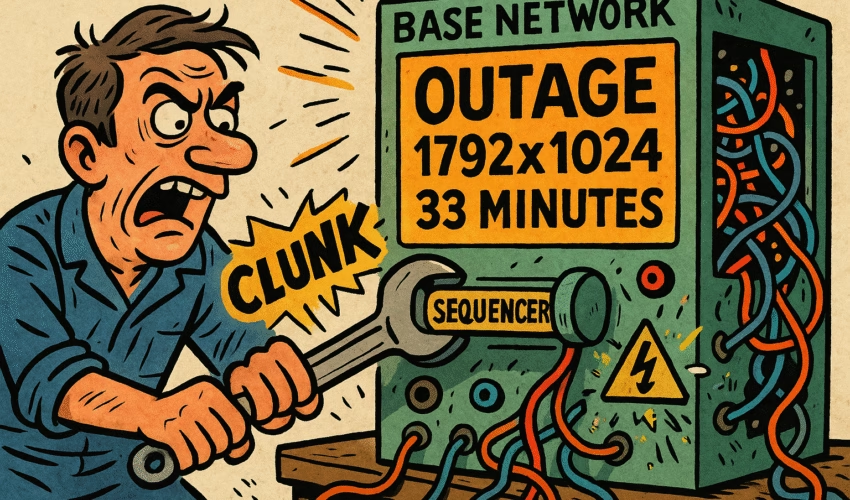Base Network Blames Faulty Sequencer for 33-Minute Outage, Promises Fixes
Coinbase’s Ethereum Layer-2 network, Base, experienced a 33-minute block production halt on August 5 after a sequencer switch malfunctioned, highlighting the ongoing centralization concerns of the network. The issue has since been resolved, and infrastructure improvements are underway to prevent recurrence.
What Caused the Outage?
The outage began at 6:07 a.m. UTC, when Base’s primary sequencer started falling behind on block production. In response, Base’s management tool Conductor automatically switched to a backup sequencer — but it chose a “still-in-setup” mainnet sequencer that was not yet capable of processing transactions.
As a result, the network ceased producing blocks for 33 minutes, until it was fully restored at 6:40 a.m. UTC.
“We took a bit of extra time to ensure a chain reorganization wasn’t necessary,” Base stated in a post-mortem published shortly after.
Last night, Base Chain experienced a 33 minute network disruption that halted block production.
This was due to an automatic handoff to an unhealthy mainnet sequencer in the high-availability cluster. We quickly switched to a healthy mainnet sequencer and Base Chain resumed…
— Base Build (@buildonbase) August 5, 2025
Centralization Risks Exposed
The incident revealed Base’s current reliance on centralized sequencer infrastructure, where all transactions are funneled through a single, managed pathway. Although multiple sequencers exist, Conductor’s inability to vet or verify readiness left the system vulnerable.
Base, which currently secures over $4.1 billion in total value locked (TVL), said it is working to improve its Conductor system and ensure all sequencers in its cluster are transaction-ready at all times.
This was Base’s second major outage since its public launch — the first occurring on September 5, 2023, when block production paused for 43 minutes.
Accountability and Immediate Response
Base’s head of engineering, known as “aflock” on X, emphasized the seriousness of the issue:
“We take chain uptime extremely seriously. You can’t power a global economy without a solid backbone.”
He added that the engineering team responded rapidly and is now taking several steps to strengthen the network’s fault tolerance.
A Bullish Interpretation?
Despite the technical glitch, some crypto commentators viewed the event positively. Former Coinbase engineer and Save Finance founder 0xrooter called the outage “bullish downtime,” explaining:
“People only make a fuss about downtime for chains with actual users.”
Helius Labs CEO Mert Mumtaz compared the incident to Solana, a network notorious for performance hiccups but still thriving. According to DefiLlama, Solana and Base rank among the most-used chains, with 2.83 million and 1.09 million active addresses, respectively.
Solana currently holds the #2 spot in DeFi TVL with $9.6 billion, while Base ranks sixth.












